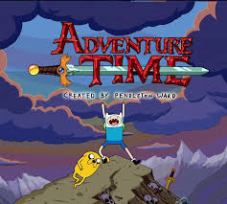Image retrieved from Adventure Time Wikia
Earlier today I opened a story on my Facebook feed that contained a plea from a fellow parent who follows the School Mum page, requesting advice as to the appropriateness of her two sons watching “Adventure Time”, an American animated television series created by Pendleton Ward for Cartoon Network. Scrolling through the comments I noticed that many other readers decried the woman for even entertaining the thought of allowing her children to view this show- frequently stating it was a cartoon designed for adults and teens.
Yet one comment stood out from the rest and rather than suggesting the mother was a bad parent instead touched a memory of a reading I had recently undertaken. In her response the responder outlined the issue is not the show but rather “adults starting to think about everything the child watches in an adult way” (Soontobgraham, 2013). This statement correlates to concepts discussed in Reconceptualising Experience (Doecke & McClenaghan, 2010). In this article Doecke (2010) states that “we need to enshrew stereotypical images of the youth being manipulated by pop culture; as if they are mindless dupes who consume what is served to them”.
It is this statement that makes it obvious what the responder actually meant: that the adult forgets or ignores that the youth of today are continuously engaged in a multi modal world that colours their views, perceptions and understandings, yet they understand the pop culture they interact with and thus are able to grasp concepts, acquire perceptions and make sense of the information gained in a manner that is relevant to them and not to an adult. Essentially the adult, be it the teacher or the parent, needs to use the child’s experiences and understandings in a manner that allows them to meaningfully connect with the learning. By placing the student experiences and understanding at the centre of the learning we as teachers and adults can promote an education that the STUDENT relates too and thus enable them to in turn learn, retain and apply their knowledge (Fain, n.d).
In teaching it is common to make text connections(Hall, 2011) and it becomes obvious that by integrating the popular culture with the student’s understandings the development of student knowledge allows them to understand themselves, the world around them and their place in it- essentially making pop culture connections. Doecke (2010) states that we need to see beyond the concepts of the youth being an unthinking consumer and instead acknowledge the importance of popular culture and the effects it has on our children’s knowledge and understandings. Rather than focusing on concepts that Adventure Time is a destroyer of the child’s innocence it would be more beneficial if the parent sat with the child while they engaged in the popular culture and discussed the concepts and perceptions the child gains from the interaction, thus allowing the child to explore and develop understanding of the various concept they, and not the adult, perceives.
Essentially Doecke (2010) argues in his article that we need to acknowledge the importance and meanings of the popular culture in relation to the child: We as adults do not have to enjoy or like their interests. Rather by focusing on the process of teaching interpretation and discrimination- instead of merely incorporating popular culture into our lesson plans and units- we will ensure the child is able to engage not with a show but rather with the messages and understandings they perceive in the content and thus facilitate the development of meta critical awareness in the future generation.
Works Cited
Doecke, B., & McClenaghan, D. (2010). Ch 14 Reconceptualising Experience. In S. Gannon, M. Howie, & W. Sawyer, Charged with Meaning: Reviewing English Third Edition. Putney:NSW: Phoenix Education.
Fain, T. A. (n.d). American Popular Culture: Should we integrate it into American Education? Education Vol 124 (4), briancollier.com?classreadings/american_pop.culture-and_ed.pdf.
Hall, L. (2011). How popular culture texts inform and shape student discussions of social studies texts. Journal of Adolescent and Adult Literacies 55(4), 296-305.
Soontobgraham, D. (2013, September 30). School Mum. Retrieved from Facebook: https://www.facebook.com/schoolmumma?hc_location=stream
Ward, P. (2013). Adventure Time (no copyright).png. Retrieved from Adventure Time Wikia: http://adventuretime.wikia.com/wiki/File:Adventure_Time_%28no_copyright%29.png
